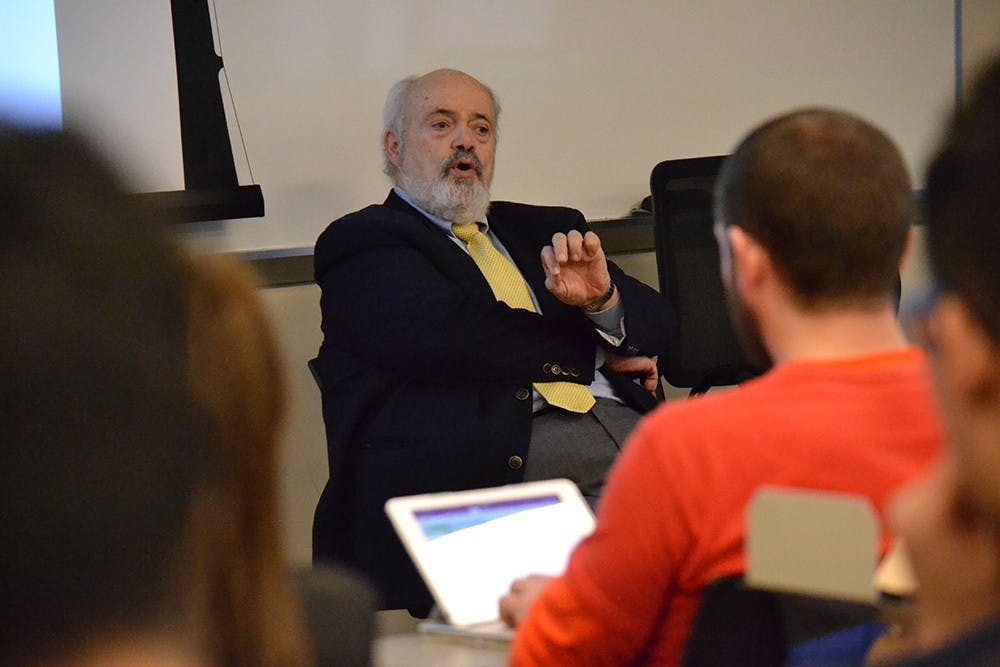Professor Guy Peters spoke with students, faculty and staff about the various “shadows” affecting United States governance at noon Friday in the School of Public and Environmental Affairs.
Peters’ talk, “Governing in the Shadows: Alternative Forms of Governance,” was part of SPEA’s Governance and Management faculty group speaker series.
Currently serving as an adjunct professor at the University of Pittsburgh’s Graduate School of Public and International Affairs, Peters specializes in comparative public policy and administration and American public administration.
“We can think about governance as being performed by a variety of different actors,” Peters said. “The state, the market, the society and expertise.”
Developed by German political and legal scientist Fritz Scharpf, the term “shadow of hierarchy,” in essence, refers to the implicit threat of legislators to enact adverse legislation if the potentially affected actors do not alter their behavior to meet the legislators’ demands.
Through this pressure, which is usually not actively introduced, the shadow of hierarchy generates important incentives for cooperation from non-state actors.
“If we want to think about how this works, we have to think about the actors involved,” Peters said. “How do the actors involved deal with these alternative forms of governance, how do we make choices?”
During his talk, Peters discussed the different roles of these individual actors and the ways in which their respective “shadows” influence, both positively and negatively, the decision-making process.
“The individual actors construct — or alternatively deconstruct — the options of alternative forms of governance,” Peters said.
This view is different from those put forth in much of the literature on governance through networks and other social actors, such as Scharpf’s argument that the delegation to these actors is all conducted in a “shadow of hierarchy.”
Peters said society, or other social actors of a variety of forms, provides alternative forms of governance.
“They may not have formal authority, they usually don’t, but they have other resources they can use for governance.”
“A lot of the involvement of social actors comes as the result of state failure,” Peters said. “But we’re not just talking about Somalia here.”
Peters said state failure often occurs in smaller but meaningful ways when it cannot provide adequate government or adequate social services.
Both historically and currently, Peters said much of the decision-making process in governance is actually done by market actors and business corporations.
When they want some type of stable form of government or social and educational services the state is incapable of providing, market actors will step in and cover the cost.
“These market actors place limits on governments and what governments can do and how effectively they are able to pursue their own goals through public sector action,” Peters said.
Though market actors often provide funding for services that benefit society at large, Peters said there exists the possibility for a negative side as well, particularly corruption as a form of economic governance.
Next, Peters discussed the shadow of expertise.
“The notion here is that we are sometimes quite willing to allow the state to delegate the expert organizations, that may be quasi-public or may be private, to deal with government issues,” Peters said.
Peters said this often occurs in part because of the information asymmetry that exists between the government and expert organizations.
“They may be willing to delegate simply because they do not have the information to govern effectively,” Peters said.
Peters said a negative aspect of the shadow of expertise is the potential for technocracy, or the government or control of society by an elite of technical experts.
“Even in normal democratic systems and representative democracies, we’re dealing with a lot of information asymmetry, so, again, we may be delegating an awful lot,” Peters said.
Ultimately, Peters said his research is exploring the various instruments at work in these theories and shadows.
“The fundamental argument that I would make is that a lot of these choices are trying to find hybrids,” Peters said.
Peters said movement and interaction between actors was the result of sheer necessity in most of the cases he has observed, but he is more interested in voluntary interaction between actors.
“I’m trying to tease out the utility behind these notions of hybrid forms of government and how we move back and forth among the alternatives,” Peters said. “Hopefully it’s a way to deal with some of the issues in contemporary government.”
Thomas Rabovsky, an assistant professor of public management at SPEA, serves as the coordinator for the Governance and Management Faculty Group speaker series.
“One of the goals of the talk is for us to learn more about the cutting edge of research in our field, and we encourage them to think of the talk as an opportunity to get feedback or suggestions regarding new or developing research,” Rabovsky said.
As a result, Rabovsky said speakers typically present a new project they are working on, rather than something that has already been completed and widely read.
“Public affairs, like most academic disciplines, is really as much a social community as it is a scientific discipline,” Rabovsky said. “Getting to know these scholars as people and establishing a personal connection with them can be really helpful, particularly for our graduate students.”






